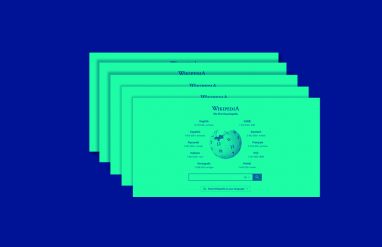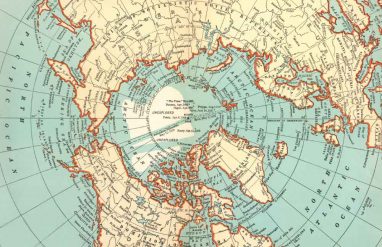Have you ever wandered the recesses of the deep web and dark web? Or have you simply wondered what these expressions mean? These two terms are just as mysterious as they sound, but they’re not synonyms, despite how similar they may seem at first glance.
There’s a lot of confusion out there about how to distinguish between these two terms, which both define hidden aspects of the Internet. So much so, that tech-savvy publications generally use a disclaimer when discussing the dark web, reminding their readers that it is not to be confused with the deep web, which is related, but not at all the same thing.
So if they’re not synonyms, what exactly are the dark web and the deep web, and why are technology reporters so wary when using either term?
What is the deep web?
Both deep web and dark web were coined recently, first appearing around 2000–05.
Dictionary.com defines deep web as “the portion of the Internet that is hidden from conventional search engines, as by encryption; the aggregate of unindexed websites.”
Deep is an old word, first recorded before the year 900. It comes from the Old English adjective dēop and is related to dip. It has various definitions, including “mysterious, obscure” and “reaching or advancing far down.” (Fun fact: the less-mysterious, searchable Internet is also known as the surface web.)
What is the dark web?
The dark web, on the other hand, is defined as “the portion of the Internet that is intentionally hidden from search engines, uses masked IP addresses, and is accessible only with a special web browser: part of the deep web.”
Dark (which can mean “hidden; secret”) is first found before the year 1000 and comes from the Middle English word derk.
When it comes to both of these terms, the word web is short for World Wide Web, a term that was first found in 1990–95.
The key takeaway here is that the dark web is part of the deep web.
What do these two terms have in common?
What the dark web and the deep web have in common is that they are both hidden from commercial search engines. You cannot access either from Google or Bing. The deep web is a general, catch-all term that includes not only the dark web, but also includes a lot of “mundane content,” according to Andy Greenberg at Wired. That would include “registration-required web forums and dynamically-created pages” (like Gmail).
When people discuss the seedy underbelly of the Internet where you can buy stolen data, drugs, weapons, child pornography, murders-for-hire—basically any illicit item or service you could dream up—that’s the dark web.
Greenberg notes that while the deep web is vast and accounts for 90-something percent of the Internet, the dark web likely only accounts for about .01 percent. The dark web, sometimes referred to as Darknet, is accessed by Tor (The Onion Router) or I2P (Invisible Internet Project), which use masked IP addresses to maintain anonymity for users and site owners. This way, people who use the dark web for illegal purposes can’t be traced, and it’s difficult to tell who hosts a particular site.
Who uses the dark web?
The dark web isn’t all illicit deals and seedy undertakings; it’s used for an array of purposes.
Journalists use the dark web to help protect the anonymity of their sources, and others use the dark web simply because they believe strongly in their right to privacy. The US Department of Defense developed Tor, which is now run as a nonprofit by volunteers. It is funded by the likes of the US government and the National Science Foundation.
“Government support for Tor has continued in recent years as part of the State Department’s internet freedom agenda,” explains Timothy B. Lee on Vox, “which seeks to help people in repressive regimes gain access to information censored by their governments.” For instance, Facebook launched a version of its site on the dark web to “make it easier to access the site from countries that restrict the service, such as China and Iran.”
Unfortunately, the dark web received a lot of media attention around 2014–15 when the founder of online black market Silk Road was convicted of various crimes, including several attempted murders-for-hire. Silk Road ran its operations on the dark web. Lately, hackers have been in the news due to attempts to sell stolen data on the dark web.
Are the terms dark web and deep web synonyms?
One common misconception about the dark web and the deep web is that these two terms are interchangeable. This is simply not true.
Take, for example, this sentence in Business Insider: “The Dark (or Deep) Web, which refers to areas of the Internet normally inaccessible to users without special anonymizing software, first came to prominence with the Silk Road trial.”
While, yes, both the deep and dark web are featured in news stories about illicit online behavior, this writer is clearly referring specifically to the dark web, which is just a tiny portion of the deep web where users employ masked IP addresses to conceal their identity.
On Funny or Die, comedian Hannibal Buress joked about “The Deep Webbys.” Awards include “Most Stolen Identity,” “Leakiest Wiki,” and “The People’s Choice Award for the Trafficking of the Choicest People.” Though his delivery is pristine, this is another example of deep web being confused for dark web. The sorts of illegal activities and documents named in these awards are bought, sold, and hosted via the dark web.
Portlandia made a similar mistake, straight-up confusing the terms when the Mayor, in an attempt to purchase fireworks for the 4th of July exclaims, “Man, this deep web has everything! Guns … drugs … explosives!” However, the Mayor is not a technical genius, so we can forgive him for his mistake.
Orphan Black makes out a little better. Cal, a tech-startup-wiz turned reclusive lumbersexual, details his efforts to help Sarah and her daughter, saying “I followed this person on the Darknet, and I saw them asking the same questions as me.” This checks out. The dark web and Darknet refer to the same thing.
Will the definition eventually change and expand?
Will deep web start to mean both the deep web and the dark web, with disambiguation only to be achieved by context?
This would not be the first time this sort of thing happened in the English language. Decimate used to describe the ancient Roman practice of killing one out of 10 of a group of mutinous soldiers, as to teach a lesson the remaining troops, but now it more generally means “to destroy a great number or proportion of something.” Those very attached to the older sense can become enraged when they hear the newer sense—and what they consider to be the incorrect sense—used. Is deep web destined to decimate’s fate?
In Garner’s Modern American Usage, Bryan Garner advises avoiding “skunked terms” like decimate if we don’t want to distract readers or listeners who happen to have strong biases either way. Is that what we should do here?
Perhaps, though deep web and dark web are still young terms; those who currently confuse the two don’t have any strong biases either way, so these terms are far from skunked. It’s possible that, as people become more aware of the different entities they describe, confusion will die down. But is this likely? The deep technical nature of these terms might mean that the majority of English speakers will remain forever in the dark.














